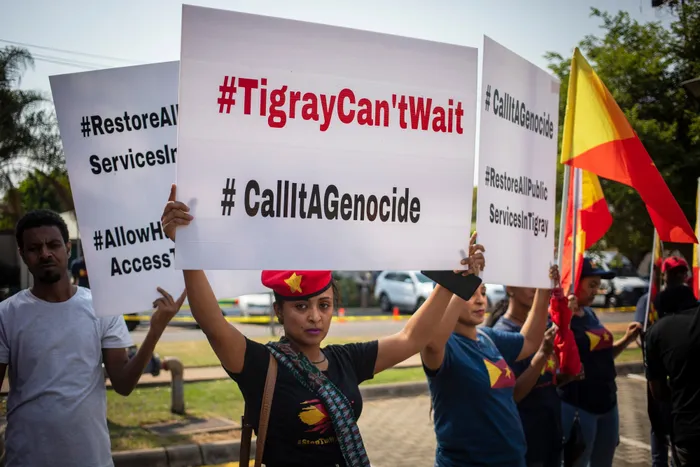Peace for Tigray

Picture: Kim Ludbrook/EPA-EFE – Members of the Tigrayan Community in South Africa gather outside the United States Embassy calling for an end to their claimed genocide of the Tigray communities in Ethiopia in Pretoria, South Africa, October 12, 2022. The peace agreement is a major breakthrough for the conflict-ridden region, which has been plagued by blood-shed and violence for over two years, costing thousands of lives, the writer says.
By Chad Williams
Mediators in Pretoria have hailed the peace process as an African solution to an African problem, after parties meeting in Pretoria, South Africa, to bring an end to the two-year conflict in Tigray, reach consensus.
The Ethiopian government and regional forces from Tigray have agreed to cease hostilities, African Union mediator Olusegun Obasanjo said on Wednesday during a media briefing which started almost three hours later than scheduled.
The peace agreement is a major breakthrough for the conflict-ridden region which has been plagued by blood-shed and violence for over two years, costing thousands of lives.
Obasanjo said this moment is not the end of the peace process. Implementation of the peace agreement signed today is critical for its success," said Obasanjo, adding that this would be supervised and monitored by a high-level AU panel.
“The two parties in the Ethiopian conflict have formally agreed to the cessation of hostilities as well as to systematic, orderly, smooth and co-ordinated disarmament,” said Olusegun Obasanjo, head of the AU mediation team, at a ceremony, after 10 days on intensive negotiations to reach a consensus.
The mediation team said the agreement also included "restoration of law and order, restoration of services, unhindered access to humanitarian supplies, and protection of civilians".
In a joint statement issued by the Ethiopian Government and the Tigray People’s Liberation Front, the parties agreed that the conflict has brought a tragic degree of loss of lives and livelihoods, and said that it is in the interest of the entire people of Ethiopia to leave this chapter of conflict behind and live in peace and harmony.
The parties agreed that it is fundamental to reaffirm their commitment to safeguarding the sovereignty and territorial integrity of Ethiopia and to uphold the constitution of Ethiopia.
The parties added that they have also agreed on a detailed programme of disarmament, demobilisation and reintegration for the TPLF combatants, taking into account the security situation on the ground.
UN Secretary-General Antonio Guterres welcomed the truce, according to UN spokesperson Stephane Dujarric.
Dujarric told the media on Wednesday that “the truce is very much a welcome first step, which the UN hopes can start to bring some solace to the millions of Ethiopian civilians who have really suffered during this conflict”.
The first formal peace talks, which were held behind closed doors, were aimed at ending the two-year Ethiopian war between the Ethiopian army and forces from the country’s northern region of Tigray started in South Africa on October 25.
President Cyril Ramaphosa said last week that he was honoured that South Africa was asked to host the AU-led peace talks between the Ethiopian government and Tigray forces.
Researchers have estimated that as many as 500,000 Tigrayans have lost their lives from the war and related causes.
Meanwhile, US State Department spokesperson Ned Price told reporters on Wednesday that the agreement between the Ethiopian government and regional forces from Tigray to cease hostilities represents an important step for peace, adding that Washington will continue to engage to advance the peace agreement.
Chad Williams is a multimedia journalist for IOL News
This article was exclusively written for The African. To republish, see terms and conditions.